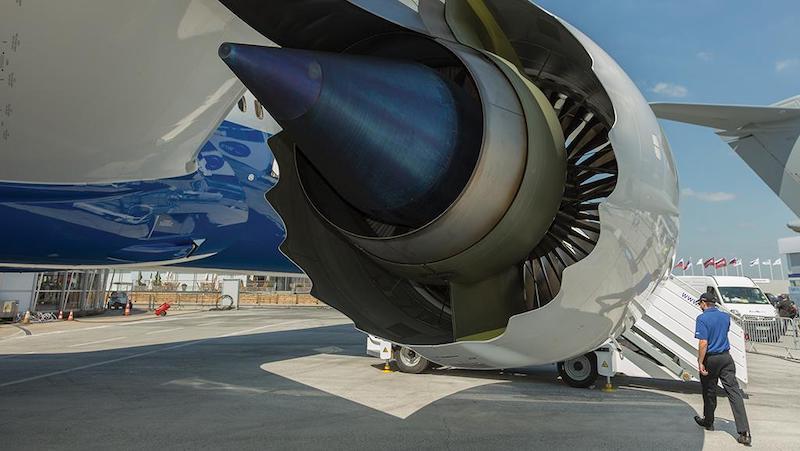
Commercial engine aftermarket activity at the Farnborough Airshow is typically related to OEM service agreements attached to new aircraft and engine orders.
At this year’s show the trend has continued, with several big-ticket orders for new-generation programs, including some maintenance-inclusive deals where MRO responsibility is transferred to the manufacturer.
The engine segment accounts for the largest share of the commercial aftermarket, commanding 48% in 2024, which Aviation Week’s Fleet & MRO Forecasts data values at $53.1 billion. When Farnborough last convened in July 2022, engine orders were dominated by a narrowbody segment in full recovery mode as traffic continued to ascend post-pandemic and operators began to enact some of their future fleet considerations.
Two years later—following a subsequent period of material shortages, extended repair lead times and durability issues sparking operator concerns related to time-on-wing—long-term confidence does not appear to be dented in either the CFM International Leap or the Pratt & Whitney Geared Turbofan (GTF) engine programs.
While airlines have placed orders for both engine types, leasing companies have also been a big buyers of these engines at Farnborough while generally not buying engines. The trend of lessors increasing their presence in the engine segment comes average lease rates rise. Avolon placed an order for 160 PW1100G engines for 80 Airbus A320neo aircraft, along with a separate commitment for 150 Leap 1A engines as part of a 75-strong A320neo order. Fellow lessor SMBC, which already has 142 GTF engines in its portfolio, also placed a hefty order for more engines, totaling 42, while Macquarie AirFinance finalized an agreement for 20 737 MAX aircraft powered by 40 Leap 1Bs.
While under pressure to deliver a high volume of engines, both manufacturers have been ramping up the aftermarket side of their businesses over the past few years as engine shop capacity remains constrained against a backdrop of increasing shop visit demand.
CFM runs a Leap network comprised of eight shops operated by the Safran and GE Aerospace joint venture's partners, 10 on-site shops providing quick-turn services and five external MRO partners in its open Leap network around the world. The company is hoping to add more maintenance companies to its external network. This year, it has been administering fixes to the engine’s fuel nozzle coking system on both production and in-service engines. The fixes aim to improve engine durability by installing a retrofittable external device called the reverse bleed system.
Meanwhile, Pratt & Whitney has gradually added to its GTF aftermarket network with 10 active shops, including expansions to an existing MRO site in West Palm Beach, Florida, with the intention to add more facilities down the line. The OEM is operating on a time frame of 2026 for implementing GTF fixes on engines impacted by problems with the combustion/heat exchanger and the high-pressure turbine blades. The issues have led to multiple operator groundings. This week, Switzerland-based MRO SR Technics confirmed the induction of its first GTF engine at its shop in Zurich.
The widebody engine segment, viewed as stable in terms of maintenance demand, is where the most intriguing engine order occurred this week. UK flag-carrier British Airways (BA) selected the GEnx engine as the powerplant for six on-order Boeing 787s. The selection raised eyebrows as it represents a switch from BA's current 787 engine partner, Rolls-Royce.
The UK-based engine manufacturer’s Trent 1000 engine powers BA’s existing fleet of 35 787s, but for several years the engine has experienced durability issues. Rolls-Royce has previously admitted to losing market share on the Trent 1000 due to the engine not being sufficiently durable, and the British company has outlined plans to add design enhancements to improve the issues.
Rolls-Royce plans to invest heavily in its Trent aftermarket network and recently outlined plans to do so in the UK and Germany, while establishing an engine repair joint venture in China with Air China by 2026. Meanwhile, GE Aerospace has also committed to invest $1 billion over five years in its global MRO facilities across the Americas, Europe and Asia. While the majority of this investment will support the Leap engine family, it also includes widebody engine maintenance.
